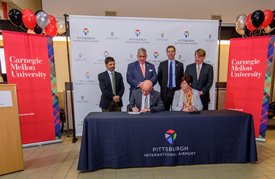PITTSBURGH — Pittsburgh International Airport and Carnegie Mellon University are enhancing traveler experiences and airport operations through a partnership to develop new systems and technologies for the aviation industry.
Allegheny County Airport Authority CEO Christina Cassotis and CMU President Farnam Jahanian signed a Memorandum of Understanding today that will allow faculty and students from CMU’s Metro 21: Smart Cities Institute to research, develop and deploy several innovative projects throughout the airport.
“As County Executive, and an alumnus of Carnegie Mellon University, I’m excited about this partnership and look forward to what will be developed through this collaboration,” said County Executive Rich Fitzgerald. “Innovation is in our DNA in this region and for our airport to reflect the community it serves, it also needs to be part of the airport. Knowing the vision that Christina Cassotis has for our airport, and the ingenuity that President Jahanian brings to CMU, I expect to see great things as these two and their organizations work together.”
“Pittsburgh International Airport plays a critical role in our economy and shares our vision for making the Pittsburgh region a model for communities across the world. This agreement will help our Metro21 Institute to continue and expand data-driven projects in a real-world setting,” Jahanian said. “With strengths at the nexus of technology and humanity, CMU is uniquely positioned to collaborate with aviation industry experts to optimize and enhance experiences for travelers and workers.”
“Carnegie Mellon University is a world-class organization and a leader in innovation and technology that has helped fuel the Pittsburgh region’s growth as a tech giant,” Cassotis said. “We want the airport to be reflective of that same tech economy that’s revolutionizing our region. This partnership with CMU will allow the airport and the traveling public to be at the forefront of that innovation.”
CMU and Pittsburgh International Airport have been working together for three years on a variety of projects, several of which focus on access and inclusion. The following projects are representative of the types of work the new partnership will support.
Researchers from CMU’s Traffic21 Institute developed a mobile application that identifies and guides drivers to empty parking spots located closest to terminal entryways, making long-term parking more convenient. A video demonstration of the application is available at https://vimeo.com/225180902 .
In addition, Pittsburgh International Airport and CMU’s Heinz College of Information Systems and Public Policy have partnered on a series of student capstone projects, the fifth of which will be completed this semester. Teams have been investigating how to better understand the flow patterns of airport travelers, including improving the experience for travelers with reduced mobility. Capstone projects will continue to systematically explore and identify topics for funded research.
CMU’s Cognitive Assistance Lab also has been developing and testing NavCog, a smartphone-based navigation system to help people with visual impairments navigate the airport. The system provides step-by-step directions using Bluetooth Low Energy beacons throughout the airport.
PIT, CMU partner to form aviation innovation laboratory
